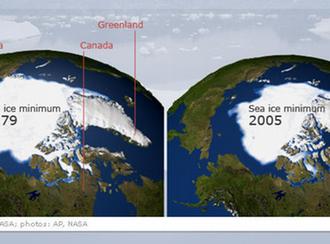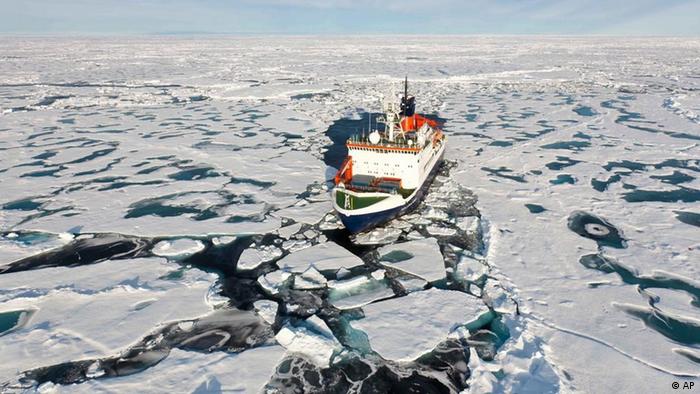The ice cap across the Arctic Ocean has shrunk to its lowest recorded size, and more may melt before the end of the northern hemisphere's summer. The ice retreat is a sign of climate change, say US scientists.
Arctic ice is considered vital for the planet because it reflects solar energy from the sun back into space, helping to cool the globe's climate.
The US National Snow and Ice Data Center and the space agency NASA said on Tuesday that the Arctic sea ice, which was once a big block, has become "slush," now spanning only 4.1 million square kilometers (1.6 million square miles).
The ice area was some 70,000 square kilometers less than the summer-time record set in 2007, the institutions said. Arctic weather this year was said to be unremarkable - other than a storm that shattered the ice sheet in early August.
"It's likely we are going to surpass the record decline by a fair amount this year by the time all is said and done," Walt Meier, a scientist at the data center in Boulder, Colorado, said.

Satellite images since 1979 show dramatic shrinkage of sea ice
"At least parts of the Arctic have become like a giant slushie," Meier said, adding that previously the sea ice was a contiguous block that only melted from the edges. "Now it's like crushed ice … that's a lot easier to melt and melt more quickly."
Melt even worse than forecasts
The melt was faster than even predicted in worst-case climate models, according to Michael E. Mann, an earth scientist at Penn State University who was the lead author of a major United Nations report in 2001 on climate change.
"The sea ice decline is perhaps the most profound of those cautionary tales because the models have basically predicted that we shouldn't see what we're seeing now for several decades," Mann said.
Arctic soon without summer ice
NASA Chief Scientist Waleed Abdalati said the record ice depletion was a signal that the North Pole would soon not have significant ice cover during its summer months.
Abdalati said the world community should be alarmed because the Arctic's ice cover was a key factor for the creation of climatic and weather conditions under which modern society had developed.
A recent edition of the magazine "Geophysical Research" pointed to correlations between arctic melt and extreme weather events such as droughts, floods, heatwaves and cold snaps.
Billions in jeopardy, says Greenpeace
While industry lobby groups say fossil fuel limitation would be too costly for the economy, Greenpeace said on Monday that the planet was "warming up at a rate that puts billions of people's future in jeopardy."
Greenpeace executive director Kumi Naidoo said: "These figures are not the result of some freak of nature but the effects of man-made global warming caused by our reliance on dirty fossil fuels."
Greenpeace activists, including Naidoo, briefly occupied a Russian oil rig in the Pechora Sea region of the Arctic on Friday of last week, saying they wanted to highlight ecosystem risks.
The Arctic is estimated to hold a third of the world's undiscovered oil and gas. As the sea ice melts, shipping operators have increasingly penetrated once-inaccessible waters to shorten voyages, for example, between China and Europe.
Australia aligns climate rules with EU
Australia, one of the world's highest per capita emitters of greenhouse gases because of its reliance on coal-fired power stations, has decided to realign its emission trading scheme to match the European Union by 2018.

Australia's Greg Combet wants to align climate trading with EU standards
Climate Change Minister Greg Compet, who was responding to complaints by pollutant firms in Australia that charges were too high, said linking the Australian and EU systems was the "most efficient means" of achieving emissions reductions.
In July, Australia's Labour government imposed a tax on around 300 of its biggest polluters.
Weather vagaries benefit Argentina
In another sign of vagaries in global weather, Argentine growers say record rainfalls in August have left their soils with "very good moisture reserves" as they prepare to plant corn and soy.
"The central part of the corn belt - eastern Cordoba province, Sante Fe, Entre Rios and northern Buenos Aires - are very well positioned for planting," said a meteorological consultant in Buenos Aires, German Heinzenknecht.
Global grain stocks are set to be depleted by the worst US drought in decades and poor crops in Europe's Black Sea bread basket.
ipj/msh (Reuters, AFP) dw de

Comments